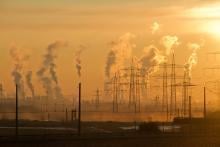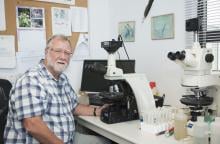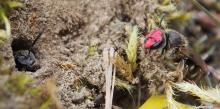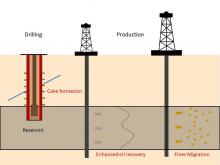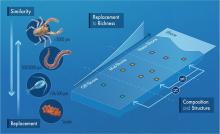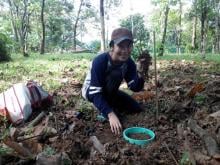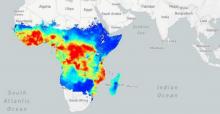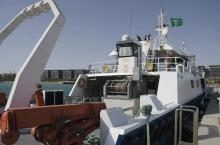Earth Sciences
News
30 Oct 2018
A metal-organic framework that selectively removes impurities from natural gas could allow greater use of this cleaner fossil fuel.

29 Oct 2018
Call for Abstracts - Deadline: November 20, 2018

20 Oct 2018
Advancing Low Carbon Cities in Malaysia

12 Oct 2018
Researchers have found a way to predict if it will be an El Niño or La Niña year up to 17 months in advance.

12 Oct 2018
Policy experts gather in Tokyo to discuss science advice in a changing world
11 Oct 2018
A new study has utilized a novel method to estimate long-term ozone exposure and previously reported epidemiological results to quantify the health burden from long-term ozone exposure in three major regions of the world.
09 Oct 2018
Professor Richard Bernhart Owen of the HKBU Department of Geography has analysed African lake sedimentary cores and established connections between a drying climate and technological and evolutionary changes in early humans.
09 Oct 2018
New simulations indicate that swirling ammonia in combustion chambers can help reduce harmful emissions – insight that may help on-going efforts to develop ammonia as a carbon-free fuel source.
09 Oct 2018
Females of a socially monogamous passerine, the Japanese great tit (Parus minor), become more promiscuous after hatchings fail in the first breeding attempt — apparently attempting to ensure successful reproduction.
09 Oct 2018
Tantalum nitride as thin layers improve the extraction of electrons from silicon solar cells.
04 Oct 2018
The LUI Che Woo Prize – Prize for World Civilisation and the Hong Kong Polytechnic University (PolyU) today co-hosted the Welfare Betterment Prize Laureate Public Lecture at PolyU.
04 Oct 2018
Both sexes of a songbird called the blue-capped cordon-bleu intensify courtship performances that involve singing and dancing in the presence of an audience, especially if it is a member of the opposite sex, an international team of researchers has discovered. [Joint press release by Hokkaido University and Max Planck Institute for Ornithology.]
04 Oct 2018
Genetics isn’t as important as once thought for the evolution of altruistic social behavior in some organisms, a new insight into a decade-long debate.

02 Oct 2018
The event also garnered strong support from the global innovation and enterprise community

01 Oct 2018
With rapidly increasing research output, Daegu Gyeongbuk Institute of Science and Technology applauded by Nature Index as a rising star.
01 Oct 2018
A comprehensive model for simulating mudcake growth during oil extraction could transform well-drilling protocols.
01 Oct 2018
Composition in cryptic fauna assemblages changes across a shelf gradient, a recent study of the Red Sea shows.
01 Oct 2018
A numerical study reveals how to reduce instabilities in the complex flow of plasma in converging geometry of particles in fusion reactions.
25 Sep 2018
Climate change forecasts could improve by better understanding the variation in natural carbon emissions from different vegetation types.
20 Sep 2018
Tools developed by Håvard Rue have transformed data analysis, interpretation and communication and are applied broadly: from modeling the spread of infectious diseases to mapping fish stocks.
19 Sep 2018
The unearthed bones of “Mukawaryu,” Japan’s largest complete dinosaur skeleton, have now been prepared and pieced together, giving us a fuller and clearer image of the 72 million-year-old dinosaur.
19 Sep 2018
A team including researchers from Nagoya University finds evidence of collisionless energy transfer occurring in the plasma of Earth's magnetosphere.

18 Sep 2018
Dr. Sivaprakash Sengodan, 2015 Ph.D. graduate from South Korea's Ulsan National Institute of Science and Technology (UNIST), has been appointed as a professor at Imperial College of London.
18 Sep 2018
South Korea's Ulsan National Institute of Science and Technology (UNIST) has been selected for the 2018 Basic Research Projects in Science and Engineering.
18 Sep 2018
A recent study, affiliated with South Korea's Ulsan National Institute of Science and Technology (UNIST) presented a case study on the temporal and spatial variability of the urban heat island (UHI) effect by geographical location in the study area of Ulsan, Korea.

18 Sep 2018
A graduate student from South Korea's Ulsan National Institute of Science and Technology (UNIST) has been selected for GRA-NRF Program in Canada.
17 Sep 2018
A student-led startup team, affiliated with South Korea's Ulsan National Institute of Science and Technology (UNIST) has been awarded grand prize at the "2018 Startup Competition, Using National Defense Technology".
17 Sep 2018
A carbon source stemming from daily fish migrations is implicated in the global carbon cycle.

14 Sep 2018
Green Economy & Industry 4.0: Achieving Sustainable Development Goals
Events
Sorry, nothing coming up for this discipline
Researchers
Sorry, nothing coming up for this discipline
Giants in history
Sorry, nothing coming up for this discipline




